- Administrator
- Albums and Singles

Karen Dalton
In My Own Time (CD & LP)
(Originally Released 1971)
CD Available Now
180gram LP Available Late Nov
1.) Something on Your Mind![]() 2.) When A Man Loves A Woman
2.) When A Man Loves A Woman![]() 3.) In My Own Dream
3.) In My Own Dream![]() 4.) Katie Cruel - FULL MP3
4.) Katie Cruel - FULL MP3 ![]() 5.) How Sweet It Is
5.) How Sweet It Is![]() 6.) In A Station
6.) In A Station![]() 7.) Take Me
7.) Take Me![]() 8.) Same Old Man
8.) Same Old Man![]() 9.) One Night Of Love
9.) One Night Of Love
10.) Are You Leaving For The Country
"She is my favorite female blues singer." - Nick Cave
"Without a doubt, she is my favorite singer." - Devendra Banhart
"She sure can sing the shit out of the blues." - Fred Neil
Karen Dalton - Katie Cruel |
> Buy CD or Limited Edition 7" @ LightInTheAttic.net
* Bonus EP Featuring Previously Unreleased Tracks
(Only Available on iTunes starting Mid-Nov)
* Remastered from the Original Tapes
* CD includes 32pg Deluxe Booklet
* Exclusive liner notes from Lenny Kaye, Nick Cave,
and Devendra Banhart
* Limited Edition 7" with Pic Sleeve Also Available
The late Karen Dalton has been the muse for countless folk rock geniuses, from Bob Dylan to Devendra Banhart, from Lucinda Williams to Joanna Newsom. Legendary singer Lacy J. Dalton actually adopted her hero's surname as her own when she started her career in country music. Karen Dalton had that affect on people - her timeless, aching, blues-soaked, Native American spirit inspired both Dylan & The Band's "Katie's Been Gone" (on 'The Basement Tapes') and Nick Cave's "When I First Came To Town" (from 'Henry's Dream').
Recorded over a six month period in 1970/71 at Bearsville, 'In My Own Time' was Dalton's only fully planned and realized studio album. The material was carefully selected and crafted for her by producer/musician Harvey Brooks, the Renaissance man of rock-jazz who played bass on Dylan's "Highway 61 Revisited" and Miles' "Bitches Brew". It features ten songs that reflected Dalton's incredible ability to break just about anybody's heart - from her spectral evocation of Joe Tate's "One Night of Love," to the dark tragedy of the traditional "Katie Cruel." Known as a great interpreter of choice material, Dalton could master both country and soul genres with hauntingly pining covers of George Jones' "Take Me" and Holland-Dozier-Holland's "How Sweet It Is."
"Karen's mother was full Cherokee, and told her that if your vibrations were right, plants would grow into your room, as Karen had grown onto the Village folk scene. She had the Beat spirit as well, the existential angst which felt life was dark, perpetually in pain, and that was how you became your art, if you were a real artist.'
"'Karen was tall, willowy, had straight black hair, was long-waisted and slender, what we all wanted to look like,' Lacy J. Dalton said. And her blend of influences - the jazz of Ella Fitzgerald and Billie Holiday, the immersion of Nina Simone, the Appalachian keen of Jean Ritchie, the R&B and country that had to seep in as she made her way to New York from Oklahoma - created a 'voice for the jaded ear.'"
Karen Dalton on MySpace
Light In The Attic
Records & Distribution
www.lightintheattic.net
P.O. Box 31970
Seattle, WA 98103
Read More
- Administrator
- Albums and Singles
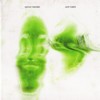 Brothers John and Michael Gibbons of Bardo Pond take an exquisite and enjoyable side trip into harmonious interstellar regions with this low-key study of vibrations. With stripped down instrumentation, they drift into shimmering passages of temporal displacement.
Brothers John and Michael Gibbons of Bardo Pond take an exquisite and enjoyable side trip into harmonious interstellar regions with this low-key study of vibrations. With stripped down instrumentation, they drift into shimmering passages of temporal displacement.
"Apostacy" starts with an acoustic guitar in each channel, accompanied by hand drums and rattles. After a brief pause halfway through, the direction of the song changes into something a little more strident. Before long, a mind-shifting sax enters, altering the mood into soothing transcendence. In the background toil drums with heavy reverb that accent the piece but never dominate. "Blood Sacrafice (for JD)" starts and ends with the only vocals to be found on the album, a sampled voice that describes the Big Bang as the original force of the universe. Rapid hand drums and electronic drones comprise this song and while it’s not a terrible detour, it’s the least satisfying track.
Amplified guitar notes hang in space on "The Medicine of the Third Order," as a quietly churning noise hovers in the background, adding a nebulous presence that’s a balm of sorts. Of the four songs on the album, "Deliquium" is the monster, taking up half of the total running length. It features two acoustic guitars again, but this time the tempo is more relaxed and lackadaisical. The brothers repeat a gentle musical phrase with minor variations, and the effect is relaxing and peaceful, suitable for blissful meditation. Only in the last minute do the strums grow more insistent, as if trying to send out pulses that will linger on in outer space well after the song’s over.
It’s a satisfying album equally at home in the dark or in daylight, and one that illuminates the promises offered by distant horizons.
samples:
 
Read More
- Administrator
- Albums and Singles
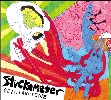 After several months of hefty improv submersion it’s possible to cultivate the taste buds enough to be able to sift out the quality from the claptrap. This is most definitely the former, a 21 minute improvised freak out wrapped in a brain-splurge primary colored aggro cover
After several months of hefty improv submersion it’s possible to cultivate the taste buds enough to be able to sift out the quality from the claptrap. This is most definitely the former, a 21 minute improvised freak out wrapped in a brain-splurge primary colored aggro cover
The latest in Low Point’s 3" CD-R series sees various luminaries of the Manchester scene (pulled from Inca Eyeball, Sculptress and Our Beautiful Ridiculous Plan) pouring out their heads into a cauldron of kaleidoscopes. The highest praise here goes to the drummer who sounds like he’s leading the proceedings from the back; the rest of the quartet squalling in his wake like sparks from a firework. The cracked open snake pit of guitars could’ve ended up a mush of sounds if not for the fine recording job here by label head Gavin Hardwick.
"Beta Carotene"s creak-and-jerk onslaught begins with a manic sonic attack that slows down about half way though, as if everyone had got the caffeine (and the rest) out of their system. This whistling and drum lull (and low-key guitar work) court each other carefully till a Thurston/Ranaldo holocaust bursts into the room.
Again it’s the drummer who seems to be directing the performance as the music threatens to roll off the road into some Turkish psychedelic murder spree. The band lands in a pattern of heaving itself to its knees before being slumping to the floor as if shot in the head. The sounds rises and falls, rises and falls until a timely loose percussive end.
samples:
 
Read More
- Administrator
- Albums and Singles

Tor Lundvall
YULE
Tor Lundvall Announces a "Ghost Ambient" Release for the Yule Season
Electronic music artist Tor Lundvall is enjoying something of a breakthrough year in 2006, his Empty City album of evocative "ghost ambient" tracks generating his highest critical attention and fastest sales to date. Tor's music was heard this month on NPR radio stations by 200,000 listeners, on the famous "Hearts of Space" radio program.
Announced today is Tor Lundvall's next release, a limited edition EP called Yule, described as "snowy soundscapes and celebratory songs for the season."
Tor explains with his Yule EP he has attempted to capture "another side" of the holiday season than the typical Christmas album, offering all original compositions in a "blurred and distant," slightly melancholic form.
Release date for Tor Lundvall's Yule EP is set as Thanksgiving 2006. It is to be a numbered limited edition of 333 copies, and will be available only directly from the label at www.strangefortune.com.
Make it a "ghost ambient" Yule this year and get in your preorder for Tor Lundvall's Yule EP:
http://strangefortune.com/cd.php?id=2811
Strange Fortune
www.strangefortune.com
The source for strange & exquisite sounds
Strange Fortune / PO Box 440383 / Somerville MA 02144 USA
Read More
- Administrator
- Albums and Singles
artist: Deerhunter
title: Cryptograms
catalog #: krank104
formats available: CD
CD UPC Code: 7 96441 81042 0
Release Date: January 29, 2007
Content: Cryptograms is the second full-length offering from Deerhunter, and their first for Kranky. The album took almost two years to finish and was the product of emotional, physical, and financial strain on the group. The result is an album that finds the band shifting from discordant catharsis, and forming a sonic identity that completely expresses the place from which they have arrived. The album functions in part as a study in duality and the concept of the same experiences seen from two angles, present and past. The most obvious manifestation of this is in the chronological sequencing. The first half of the album was recorded first unsuccessfully in 2005. These recordings were a blur at best, wordless and bordering on psychological atrophy. The sessions failed to provide anything tangible, and were racked with technical and personal problems, including out-of-tune pianos, panic attacks, and a tape machine that seemed to fail to capture the full spectrum of ambience the band was exploring. The band returned home, having failed, and considered giving up. The idea arose to give it one last shot and exactly one year from the date of the recording of their first self-titled LP at a small studio in rural GA, they returned to that same studio and plugged in. The session resulted in the first half of the record which was recorded in one day and completely filled the reel of tape they brought with them. Cryptograms’ first side begins with an introduction leading to the title track, and ends with the tape literally spinning off the end of the reel in the middle of a drone layered with bells and accordion (“Red Ink”). The second half of the record, also recorded in one day, in the November of 2005, represents the band in an entirely different state. “Spring Hall Convert” opens with the line, “…so I woke up…” and introduces a set of focused psyche-pop songs fixating on adolescence, illness, and failing connections.
Context: Deerhunter began in 2001 with the ambition of fusing the lulling hypnotic states induced by ambient and minimalist music with the klang and propulsion of garage rock. The band has weathered chaotic line-up changes, the death of a member, and much discouragement. Their live performances almost always leave audiences polarized, and have been referred to by Karen O of the yeah yeah yeah’s in NME as bordering on “a religious experience.” They are based in Atlanta.
Track Listing: 1. Intro 2. Cryptograms 3. White Ink 4. Lake Somerset 5. Providence 6. Octet 7. Red Ink 8. Spring Hall Convert 9. Strange Lights 10. Hazel St. 11. Tape Hiss Orchid 12. Heatherwood
Quote: "…a massive, psych-heavy, art-damaged five-piece, and one of the most inspired new bands we've heard in quite a while. Deerhunter's forthcoming Kranky debut -- not to mention their absolutely fucking insane live shows-- is likely to make them one of the most talked-about bands of 2007." Pitchfork 10.23.06
Read More
- Administrator
- Albums and Singles
 Not a mysterious Frenchman in fact, Benoit Pioulard is Thomas Meluch, another Midwestern boy mutating folk tradition through personal mythology, only this time it’s not founded on states in the Union or suburban Americana but on the fuzzy sublime of forests and oceans, cryptic continental romance and Bergman films.
Not a mysterious Frenchman in fact, Benoit Pioulard is Thomas Meluch, another Midwestern boy mutating folk tradition through personal mythology, only this time it’s not founded on states in the Union or suburban Americana but on the fuzzy sublime of forests and oceans, cryptic continental romance and Bergman films.
Précis is home-recorded, and the hermetic warmth and flayed edges of its creation become part of this music in an intimate way. Pioulard plays brisk autumn marches at Janschian speed while leaves and waves and tiny lights build up a thin swirling of lofi electronic noise around. His low croon is the timeless, orchestrated sound of British folk singers, leading, but always just part of the mix, nestled and mumbled in a golden vagueness. Weaker tracks are surprisingly the ones least bogged down in the smoke and mirrors of Pioulard’s bedroom production, ones where the vocal and guitar seem at competition in an anxious clinging to his mopey, jangly structures. The aching ballads and death shanties of “Palimend” and “Together & Down” work best, leafy static layers hanging above the boy with guitar, pulling him up and along with a spooky separation.
Titles “Coup de Foudre” and “Sous la Plague” emphasize the sublime evocations of such heady atmosphere; the singer in these songs is a participant only as much as he is swept away and disintegrated. Songs are suite-like or heavily cyclical, smartly straying from emphasized refrains or dynamics that would simplify or materialize the atmosphere’s glittering hover. Pioulard is an excellent writer of moods, and whether his lyrics are clichéd or unintelligible, the melancholy sentiment, autumnal glory and earnest pleadings of his songs come through in a refreshingly direct way. Despite European posturing, his images of spirit-filled desolation and romantic death feel easily approachable, universal beauties with youthful hope that I can believe in.
samples:
Read More
- Administrator
- Albums and Singles
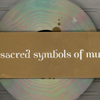 Perhaps Planet Mu's clearest attribute is founder Mike Paradinas' willingness to put out diverse releases from artists he believes in regardless of where they lie on the electronic music spectrum. Yet as this budget-priced compilation demonstrates, it's also the label's most obvious weakness.
Perhaps Planet Mu's clearest attribute is founder Mike Paradinas' willingness to put out diverse releases from artists he believes in regardless of where they lie on the electronic music spectrum. Yet as this budget-priced compilation demonstrates, it's also the label's most obvious weakness.
samples:
- Shitmat - That Track
- Pinch - Punisher
- Mileece - Tau
Read More
- Scott Mckeating
- Albums and Singles
Crushing drone and noise into a static mash, John Schofield (if indeed it is him, the credits are sketchy) builds a formidable psychedelic wall on this cracked three-tracker.
The middle untitled piece of this three-tracker clambers along rusted arthritic grooves, its face in a pillow bellow sounding like a reversing engine grunt. But it’s the first and last of these three tracks that satisfy the most, finding a space between isolationism and monochrome psychedelia. Flirting with Haino-esque notes run through a Dead C filter, the loose metallic strings ring out like spiralling bells through the dimness. The unpeeling, shining black sounds deep inside these two pieces takes them light years away from run-of-the-mill feedback sourced rust jobs.
Read More
- Administrator
- Albums and Singles
 Although as per usual, the performance is short (only around 30 minutes) this is a powerful and exciting album. Slowly building up like a stalker moving through the bushes before ending in a bloody mess, this is Wolf Eyes at the top of their game. Braxton fits in perfectly, adding an extra dimension to the noise that lifts Black Vomit from being just another Wolf Eyes live CD to an essential release.
Although as per usual, the performance is short (only around 30 minutes) this is a powerful and exciting album. Slowly building up like a stalker moving through the bushes before ending in a bloody mess, this is Wolf Eyes at the top of their game. Braxton fits in perfectly, adding an extra dimension to the noise that lifts Black Vomit from being just another Wolf Eyes live CD to an essential release.
Victo
The first track, “The Mangler,” is actually a couple of different pieces in one. Starting as a slow and menacing soundscape where Braxton and John Olsen duel with their saxophones like two jungle cats. Around them sheets of metal and electric humming adds a truckload of danger to the piece. The din simmers for about 20 minutes with the four players feeding off each other magnificently. There is a lot of restraint shown by all of them and when the performance finally bubbles over into “Stabbed in the Face” it hits with a lot more fury than I had anticipated. Nathan Young’s and Mike Connely’s vocals sound more cutting than the razor sharp feedback that erupts throughout the whole set. I’m sure if I played the disc any louder I’d be bleeding.
For the encore Braxton is asked whether he’d prefer “Leper War” or “Black Vomit” to which he gleefully demands the latter, although the sleeve notes list it as “Rationed Rot.” From his tone of voice (and indeed his playing) it is obvious that he is having the time of his life. The noise may be unsettling but the vibes from the players are good. All four are clearly enjoying themselves immensely and on the very odd occasions when the crowd are audible, it sounds like they’re enjoying themselves too. When the music ends I almost end up applauding myself!
When compared to much of the Wolf Eyes catalogue, the production on Black Vomit is crystal clear. Each of the players is given space to breath in the mix instead of it being one mess of sound. The only problem is the brevity of the performance; I could listen to this for a lot longer. However, that’s something I expect of Wolf Eyes now, indeed the short performance adds to the power of the punch and there’s always the “repeat” button. Along with Human Animal, Black Vomit has renewed my faith in Wolf Eyes after some very stale releases by them.
samples:
Read More
- Administrator
- Albums and Singles
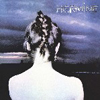 She was a tightrope walker, a writer, performed with Coum, was billed next to This Heat, and appeared in Derek Jarman's film Jubilee before becoming a musician of any kind, and yet none of these facts could prepare anyone for the quirky and sultry music on this, her second album. She was called unmusical, considered unprofessional, and never once sat herself along side the French royalty to which she was compared, but most of all she was blatantly playful and 22 years removed she's still as intriguing and confusing as she must've been then.
She was a tightrope walker, a writer, performed with Coum, was billed next to This Heat, and appeared in Derek Jarman's film Jubilee before becoming a musician of any kind, and yet none of these facts could prepare anyone for the quirky and sultry music on this, her second album. She was called unmusical, considered unprofessional, and never once sat herself along side the French royalty to which she was compared, but most of all she was blatantly playful and 22 years removed she's still as intriguing and confusing as she must've been then.
LTM
I think one critic who claimed Demoriane couldn't sing hit the nail on the head: she's clearly not an academically trained vocalist of any kind. This, of course, wouldn't make much of a difference in the world of '80s pop music because so many bands used their less than perfect utterances to give them a distinct personality. That was, however, the advantage of a pop music unrestrained by classical influences. Demoriane was called a "bar-room Marlene Dietrich" and I think it is that aspect of her musical inclination that sets her apart from anyone around her at the time. Her music, their arrangements and their overall effect, remind me of a parody of French pop: her world is the French world seen through a twisted looking glass populated by mod subculture and Warhol-ian kitsch. Listening to her music and visualizing her personality, it's not hard to imagine why she was so often scoffed at and also praised for semi-torch singer pretensions.
In a way I think she must be mocking her entire gimmick and embracing it lovingly at the same time. She covers Neil Sedaka one moment and Yoko Ono the next, covering a song dedicated to a fetus, no less. She croons as if she's reaching for the right notes, but her voice never quite makes it. It isn't any less attractive for that reason, something in her stretching, sometimes cracking delivery is endearing, filled with all the whimsy and absurdity I often associate with the world of theatre or broadway: everything is lit up and exaggerated a thousand times more than is needed precisely because it is meant for a stage. So when the live tracks that are tacked onto this album begin, it's hard not laugh with her as the musicians behind her stumble through odd and awkward approximations of MOR melody and she tells little stories in an accent so thickly Parisian that it must've been faked for added hilarity.
If it sounds like I'm panning the record, I'm not. I enjoy listening to Demoriane's strange imitations of popular music and I especially like to laugh along with her when she decides that she can't keep the front going on much longer. Most of the record is held up by the especially entertaining live performances, of that there is no doubt, but listening to the studio recordings really distinguishes Demoriane as an entertainer of several shapes and sizes. I'd expect to hear her live work in a bar somewhere, but her album cuts are strange and skewed somehow and the weird factor they exude are enough to keep them intriguing. Her personality shines through every minute of the album and is probably the most attractive thing about her music. If there's one negative thing to say about her, it's that the music can only be taken in doses. I'll listen to it here and there for entertainment, but can't see recommending it as an essential part of anyone's collection. It is an oddity in a sea of them, but one that flirts with popular much more than anyone I can think of.
samples:
Read More
- Administrator
- Albums and Singles
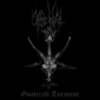 Black metal has always been associated with archaic or dying idealism, murder, violence, and generally over-the-top theatrics, but Urgehal takes it all to a new, disgusting level. Their artwork, unlike previous releases, isn't immediately repulsive, but just a glance at the lyrics will reveal some antisocial, perhaps misanthropic Norwegians in desperate need of a girlfriend or reading material that has nothing to do with either Satan or the Marquis de Sade.
Black metal has always been associated with archaic or dying idealism, murder, violence, and generally over-the-top theatrics, but Urgehal takes it all to a new, disgusting level. Their artwork, unlike previous releases, isn't immediately repulsive, but just a glance at the lyrics will reveal some antisocial, perhaps misanthropic Norwegians in desperate need of a girlfriend or reading material that has nothing to do with either Satan or the Marquis de Sade.
Southern Lord
I'm not blaming Satan for this, nor the Marquis de Sade: I wouldn't insult either of them with an accusation like that. Clearly, however, this foursome has some issues that desperately need to be sorted out. Among them are repressed sexual desires for forced sodomy, tendencies toward extreme sadomasochism, including an expressed interest in watching the torture of children, and myriad of other violent tendencies that add up to a listening experience not worth the paper the lyrics were printed on. I've read things that I think most people would find offensive and tend to be able to stomach even the most extreme of graphic images, but Urgehal leave it all out on the table without reference, rhyme, or reason. I suppose that's part of the appeal: their music is unhinged, divorced from organized thought, sympathy, or even the slightest hint of humanity.
The music is standard black metal grind: fast guitars, fast drums that typically mimic the buzz and thrash of the guitars, and a bass player who matters about as much as the song writing does. It's nothing to write home about and becomes repetitive about three songs in. That's all there is to say about the music and that leaves me, unfortunately, with a band whose opening lyrical statement is, "This is satanic black metal" and whose artwork has been dominated by extremely violent acts on an absolutely ludicrous scale. At some point, when all the violence and supposedly "evil" morality that drives bands like these swells up and becomes violence for the sake of violence, I have to stand back and try hard to laugh because my only other option is to take them seriously. I imagine that's exactly what the band wants, so I'll make a suggestion: don't buy this band's record precisely because they represent outdated modes of thought that are so completely disgusting that even Anton LaVey and his Church of Satan would be hard pressed to represent it. This doesn't represent Satanic anything, it represents a bunch of frustrated, undereducated, over-sexed, mistreated, anti-rational, pro-violence imbeciles with nothing to say but that which will shock the most people. This is as stupid as music and performance gets. Even if this is an act, and somehow I doubt it is, it's a bad one that should be cast into the halls of bad taste and pure ignorance forever.
I know not everyone is willing to conform to a standard and that not everyone thinks rationally and I can just hear all the black metal fans out there arguing that this stuff is pure hatred and should be appreciated for how pure and raw it is, as thought it were a documentary of some kind. My only reply is that even Satan was rational and all this chaos worship is just the helpless cry of people too stupid to understand that. Any number of claims any of these bands make to true Satanism, to reality, and to the facts of the matter are the results of frustration: they're the helpless utterances of talentless songwriters looking for something to shock us all with because their critical skills don't extend far beyond their own willfully limited views. I can understand the attractive elements of violence, the beauty some people see in the moment before death or in the rebellion against traditional morality, but there's nothing new under the sun, after all, and if I really cared to experience such brutality second hand, I'd go pick up a copy of Georges Bataille's Story of the Eye or de Sade's Philosophy in the Boudoir and get some intellectual stimulation while I was at it. Without that stimulation, without that eye towards understanding, all that's left is adolescent rebellion and that's the least interesting, least effective, least convincing kind of all.
samples:
Read More



